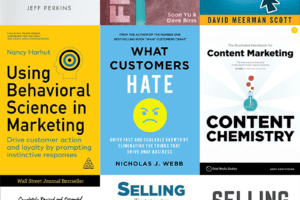Episode 58 of Yes, and Marketing
Ever wonder how many blog posts it takes to reach Hubspot-levels of internet domination?
According to Matthew Howells-Barby, the number is close to 17000—and he would know. Matthew led the content team that grew HubSpot’s organic traffic from 1 million organic searches per month to over 12 million and is today the company’s VP of Marketing. On this episode, he covers lessons from his career at the industry behemoth and also shares the story behind Traffic Think Tank, his side project that grew to $1M ARR in its first two years.
Bottom of the funnel, active marketers—this episode is for you. Matthew and Steve discuss:
- Why being with an agency isn’t necessarily better than being in-house
- How Matthew’s focus on the boring stuff has led to better results (and a more sustainable career)
- The challenges of measuring ROI at a multi-million dollar market cap company versus a startup
- Future trends in content, including how voice search is changing the way we type and the unbundling of news and content
Tap through the chapters above to listen or read on for our highlights from the conversation.
Guest-at-a-Glance
Name: Matthew Howells-Barby
What he does: VP of Marketing at Hubspot. Co-founder of Traffic Think Tank.
Find Matthew on the web: Hubspot | Traffic Think Tank | LinkedIn | Twitter
Get smart: “It’s a much more sustainable career to have when people get more excited about the results you deliver, than about the proposed projects you intend to carry out.”
Top Career Advice
Do the boring stuff really well
Matthew explains that one component of his successful career has been to avoid chasing shiny objects and get really, really good at the “boring” stuff. A flashy, ‘one in a hundred campaign’ might get a lot of traction, but there’s no way to scale it. “It’s non-sustainable growth,” he says.
Instead, he focuses on, “How can I build processes where I can say, ‘Hey, I put $1 in and get $1.20 out?’ And then I can actually resource these things and focus all of my energy on just making these processes, these workflows, just that little bit better over time,” he says.
He gives an example from his time on the optimization team at Hubspot in 2015, when the company had just gone public. They were trying to make massive bets and running all kinds of complex tests, but the highest conversion rate uplift eventually came from the simple suggestion to add “No credit card required” to the bottom of their ebook download form.
It’s that focus on small, incremental changes that has led Matthew to the top marketing position at one of the top marketing companies. “It’s a much more sustainable career to have when people get more excited about the results you deliver, than about the proposed projects you intend to carry out,” he explains
Episode Highlights
Agency vs. in-house marketers
“I don’t think it’s necessarily better to be at an agency or better to be in-house. It’s completely dependent on the agency you’re joining or the company you’re joining in-house as to the experience you’re going to get. I will say from firsthand experience, I have worked in some absolutely horrendous companies and have seen and probably learned more, to be honest, in the earlier stages of my career, on how not to operate businesses and how not to lead teams.”
ROI challenges at different company sizes
“If you’re a multi-billion dollar market cap company with maybe a hundred million plus dollar budget, you’re less worried about trying to understand the exact dollar return on investment of everything that you spend on brand. You can say, ‘Hey, this is what we believe to be the right thing to do, and we believe that there is an unmeasurable element of brand activity and there’s going to be this halo effect that we truly benefit from when we carry out these activities—but we’re just never going to be able to perfectly measure it. And if we obsess over measuring it, it’s going to hold us back from taking action.’
When you’re a small company, that’s a lot tougher to justify. It’s like, is that the place where you want to make big bets? Is the halo effect of brand campaigns at scale where there’s the most upside?”
How voice has changed the way we type
“One of the things that has shifted is the more that people talk to search engines—whether that’s your Google assistant, whether it’s Alexa, whether it’s directly into Amazon or just through a voice-enabled interface—it really starts to shift the way that people type into interfaces.
Think about the way you would search for a restaurant in Boston even just 10 years ago. You’d probably go, ‘Mexican restaurant Boston,’ right? Even if someone even said to you, ‘Hey, you can talk into this,’ you probably didn’t have that trust that the natural language processing and understanding was developed to a level that would understand you. Now, it would be weird to type that. Instead, you’d be like, ‘Hey, best restaurants near me.’
And there’s so much that goes on behind the scenes, not just in Google, but in most search interfaces that can understand the implicit requests of your request. The ‘restaurant near me’ implies it needs to be open now and within a certain radius, depending on what device you’re on. If I’m on cellular data or on my mobile device, I’m probably walking and on the move. If I’m on wifi or on my desktop, I probably don’t need it right this moment.”
The current unbundling of content
“The thing that people are really looking for, in my opinion, is a closer connection, and a more instant connection, to the creators themselves. And we’re seeing an explosion in parallel to this in the creator economy. We’re moving away from this siloed, ‘These are the small few publications where you get access to news,’ and we’re seeing the fragmentation and the unbundling of news and content and it’s being dispersed.”
Good news for new marketers
“The explosion in the creator economy is going to have long, long lasting effects on pretty much everything that we look at in content marketing. I think it’s going to be an incredibly exciting time to be starting your career in this industry. I joined and started my career in the first real wave of inbound marketing, and it was a wonderful time to be there. And I think this is an even better time to be getting started in this industry.”
The story behind Traffic Think Tank
“Nick [Eubanks] would send me emails almost on a weekly basis of different things that we should do. And one of those many, many conversations was, ‘Hey Matt, we should build a Slack channel that people pay for to get access to and learn about SEO.’ And my initial response was, ‘That’s a horrible idea and nobody’s going to pay for access to a Slack channel festival.’
And he was like, ‘Look, hear me out. I’ve been doing this thing that I’ve called provisionally Traffic Think Tank, where I get five people and do coaching sessions over the space of six months. …It hasn’t quite worked in the way I’ve wanted it to, but there’s something in this. People want this. And I think if we can do this at scale, it’ll be really interesting.’
…So we said, ‘Okay, what we’ll do is we’ll prepare a lot of content. We’ll get a lot of stuff up and running. We’ll test this out small scale, 99 bucks per month. If we can get to a hundred members in six months, we will continue this. If we don’t, we’ll kill it.’ …We hit a hundred members in, I think, five days.”
Value > Revenue
“One of the things that I am most proud of and I think has been probably the single reason that we got early traction is that when me, Ian, and Nick went into this, we all agreed that we would never prioritize revenue generation over community value. … Whenever we reached a point where there was a decision that could help generate more revenue for the business, but we didn’t understand whether it would have a negative impact on the community, we would put it to the community and we’d be very open and transparent about everything. We have the community make decisions on things and the community have really helped steer the direction of Traffic Think Tank and have kept us honest.”
Top Quotes
Matthew:
“You can learn a broader spectrum of things at a shallower level when you work at an agency.”
“Tactics have a lifespan that’s relatively short.“
“You don’t need to do something that seems truly innovative and revolutionary to deliver great results.”
“It’s a much more sustainable career to have when people get much more excited about the results you deliver, than about the proposed projects you intend to carry out.”
“If you can find enjoyment and excitement in solving those typically boring problems, you will do very, very well.”
“The base content that’s being created has not changed a whole lot. The main thing that’s changed is the interface through which they consume it, which has ultimately shifted the way in which we build content.”



